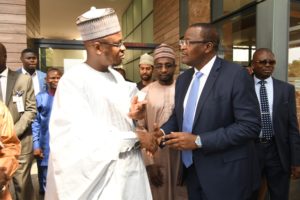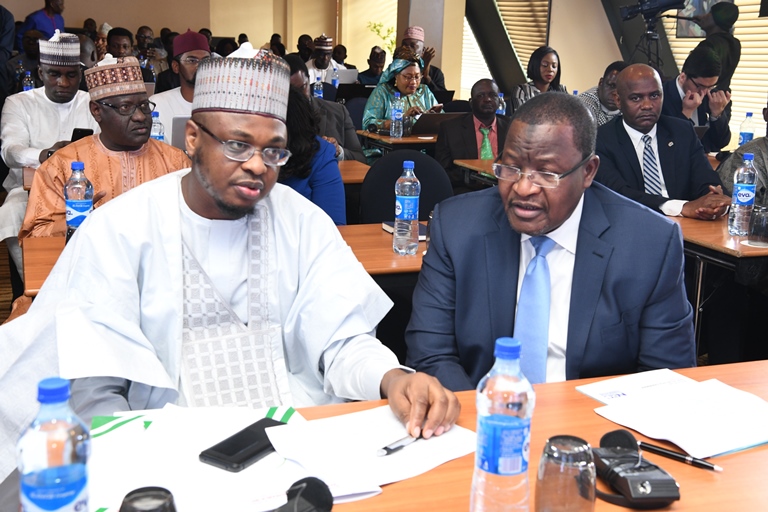The Minister of Communications and Digital Economy, Dr. Isa Ali Ibrahim (Pantami), has given the Nigerian Communications Commission (NCC) credit in the discharge of its regulatory functions.
The Minister, who gave the credit while delivering his welcome address at 7th Study Group 13 (SG 13), ongoing Regional Workshop for Africa being hosted by the NCC at the Transcorp Hilton, Abuja, acknowledged that NCC has played its role consistently in spearheading regional and global initiatives that allow Nigeria to make concrete contributions and inputs on issues bordering on telecoms networks standardisation within the International Telecommunications Union (ITU) community.
“I want to appreciate the efforts of the Nigerian Communications Commission (NCC) for representing the Federal Ministry of Communications and Digital Economy (FMoCDE) to coordinate these activities of the SG 13 of ITU in Nigeria. The effort is highly commendable. With all sense of responsibility as the Minister of FMoCDE, I commend your consistency in handling the activities of ITU and other study groups of the FMoCDE. Your efforts are most appreciated,” he said.
The Regional Workshop for Africa is a four-day programme, focused on the theme: ‘Standardisation of Future Networks Towards Building a Better Connected Africa’, has a dual structure: a workshop by the SG 13 for Africa, which commenced from 2-4, February 2020; and another special meeting by the Group scheduled for 5-6, February 2020.
While addressing participants drawn from Nigeria and other African countries as well as officials of the ITU at the event, the Minister said the NCC’s role in being at the forefront of driving the digital revolution in Nigeria is well noted.
According to him, standards are critical to the interoperability of Information and Communication Technologies (ICTs). He said the workshop is taking place at a time the Nigerian government, through the ministry, is making an effort to reposition its focus and strategies on how to use new and emerging digital technologies to transform the socio-economic life and activities of the country and for its citizens to embrace a digital economy culture that would impact positively on the lives of the people.

Earlier in his opening remarks, Prof. Umar Danbatta, Executive Vice Chairman (EVC), NCC, stated that discussions and solutions for our future networks such as cloud computing, software-defined networks and smart cities, cannot be understated.
“To achieve a resilient and robust future network, standards must be developed to accommodate the evolution of new and emerging technologies. The new frontier comes with great value and potentials for humanity and so, Nigeria and indeed, Africa cannot afford to be left behind,” Danbata stated.
Danbatta, while tasking participants come up with far-reaching resolutions, as Africa cannot afford to fail in harnessing the full benefits of the digital culture and the fourth industrial revolution, said such “resolutions will hopefully play a pivotal role at the World Telecommunications Standardization Assembly (WTSA) coming up later in the year. Danbatta affirmed that all these developments will also play significant role in achieving the new mandate for the digital economy.”
The NCC Executive Vice Chairman, therefore, charged participants to drive collective interest and let such collective interest be their focal point of discussion, “so that we can have networks that can handle the peculiarities of our environment, as we drive towards development and integration of new and emerging technologies on our dear continent”.

The Chairman, ITU SG 13, Simeon Bagudu, said the Group was established in 2008 to mobilize the effective participation of Africa in the area of ICT standardization. He enthused that the participation of Nigeria in the regional Group and in other ITU events and programmes has been ‘very remarkable.’
The ITU operates through its three sectors namely the Radiocommunications Sector (ITU-R), Standardisation Sector (ITU-T), and Development Sector (ITU-D). The Standardisation Sector through its study groups and World Telecommunications Standardisation Assembly (WTSA) uses experts from around the world to prepare, deliberate and develop international standards known as ITU-Recommendations, which act as defining elements in the global infrastructure of information and communication technologies (ICTs).
The work of Africa Regional Groups in each of the Study Groups of ITU-T, such as the SG 13, comes under the ITU-T Sector. The SG 13 was established in 2008 to bridge the standardisation gap among African countries.




